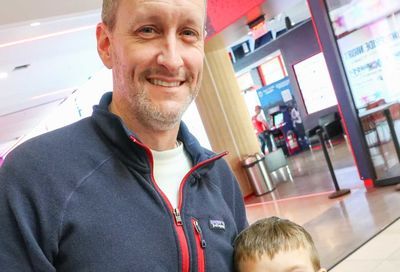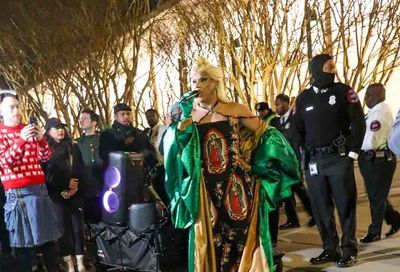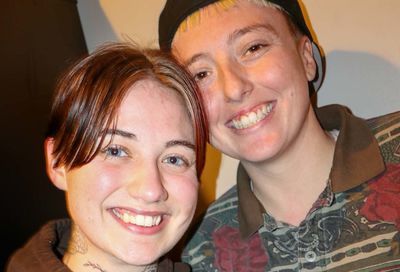Mendelson Fields Testimony
Hate-crime hearing draws activists and police – and differing perspectives
Longstanding tensions and the often rocky working relationships between LGBT activists and members of the Metropolitan Police Department were once more highlighted during a three-hour hearing at the Wilson Building held by the D.C. Council’s Judiciary Committee Nov. 2.
The hearing, called by Judiciary Chair Phil Mendelson (D-At Large), featured testimony from residents and LGBT community groups. The hearing comes after an apparent increase in violent crimes directed at members of the LGBT community.
Witnesses testified that crimes against LGBT people, particularly transgender women, have spiked following the July 20 shooting of 23-year-old transgender woman Lashai Mclean. Various community groups have hosted forums raising concerns similar to those voiced at the hearing, particularly with regard to how the MPD and the U.S. Attorney’s Office have investigated and prosecuted violent crimes against LGBT people.
In past months, activists and MPD officials have met with Deputy Mayor for Public Safety & Justice Paul Quander to discuss such issues in accordance with an agreement made during a previous hearing on hate crimes in early July. But Jason Terry, an organizer with the DC Trans Coalition, testified that such meetings have not been effective.
”Police response has, this summer, shown multiple shortcomings,” Terry said in his testimony. ”Community meetings with [MPD] Chief [Cathy] Lanier this summer have been fruitless, as much time is spent telling us why we are wrong, how we are wrong, as opposed to listening to our concerns in an active and empathetic way, and helping us identify solutions.”
Other witnesses took the opportunity to both praise the MPD for reaching out to engage the community, while also criticizing the department and the U.S. Attorney’s Office for failing to treat transgender victims in a culturally sensitive way. Some questioned the frequency, thoroughness and efficacy of LGBT sensitivity training provided to employees of both agencies.
Chris Farris, co-founder of Gays and Lesbians Opposing Violence (GLOV), told Mendelson that the bulk of such training for MPD’s Special Liaison Units – including the Gay and Lesbian Liaison Unit (GLLU) – officers is done by community members on a volunteer basis, usually requiring a commitment of unpaid time as well as drafting their own training materials. He and fellow GLOV members suggested the MPD dedicate funds for a professional training program instead.
Lanier pushed back against some of the criticism, saying she has no evidence of widespread anti-LGBT bias within MPD. She indicated, however, she would be willing to meet with members of the now-defunct Fair and Inclusive Policing Task Force, which examined possible bias within MPD, to address some of those concerns. She stopped short of agreeing to restore the task force.
”Changing the culture and involving 5,000 people is something that takes time,” Lanier said. ”It doesn’t happen overnight. It’s persistence, it is training, education, immersion, all those other things I say we’re doing.”
Regarding the sensitivity training provided to officers, Lanier said that she understands concerns about the burden shouldered by community members, and suggested she could instead used qualified officers within the department to carry out such training.
Throughout the hearing, Mendelson asked the witnesses, including Lanier, for reasons for a possible increase in violence, but none could provide a definitive answer.
Mendelson’s presence as the only councilmember in attendance throughout the hearing reflected the atmosphere in the half-full chamber of a couple dozen activists, a handful of concerned community members and about a dozen high-ranking MPD officers.
The other councilmembers on the Judiciary Commiteee – Jack Evans (D-Ward 2), Mary Cheh (D-Ward 3), Muriel Bowser (D-Ward 4) and Marion Barry (D-Ward 8) – were not in attendance, though Evans was present at the time the hearing was originally scheduled to start. A delay caused conflict with Evans’s schedule, though he submitted a written statement to the committee.
Councilmembers Tommy Wells (D-Ward 6) and Michael Brown (I-At-Large), neither of whom sit on the Judiciary Committee, were in attendance during parts of the meeting, but only Wells asked questions of some witnesses. Staffers for Evans, Wells, Brown and Barry attended the hearing.
Support Metro Weekly’s Journalism
These are challenging times for news organizations. And yet it’s crucial we stay active and provide vital resources and information to both our local readers and the world. So won’t you please take a moment and consider supporting Metro Weekly with a membership? For as little as $5 a month, you can help ensure Metro Weekly magazine and MetroWeekly.com remain free, viable resources as we provide the best, most diverse, culturally-resonant LGBTQ coverage in both the D.C. region and around the world. Memberships come with exclusive perks and discounts, your own personal digital delivery of each week’s magazine (and an archive), access to our Member's Lounge when it launches this fall, and exclusive members-only items like Metro Weekly Membership Mugs and Tote Bags! Check out all our membership levels here and please join us today!



















